Energy Metro Station is a significant stop on the Red Line of Dubai’s extensive metro system, positioned strategically in the Jebel Ali district. This station facilitates the daily commute of residents and visitors, offering a convenient link to a variety of destinations within the Dubai metropolitan area. It operates as a major hub for public transportation, providing service to areas in Jebel Ali, which is known for its commercial port and rapidly growing industrial zone.
- Energy Metro Station Timings to UAE Exchange – First Train and Last Train Timings
- Energy Metro Station Timings to Jabal Ali – First Train and Last Train Timings
- Overview of Energy Metro Station
- Location and Accessibility
- Station Design and Amenities
- Operational Hours and Timings
- Ticketing and Fares
- Strategic Importance
- Related Commercial Areas
- Cultural Significance
- Future Developments
- Frequently Asked Questions
- How do I get from Energy Metro Station to IKEA Jebel Ali?
- Can you provide directions from Energy Metro Station to Jebel Ali Temple?
- Where can I find the Dubai Metro map including Energy Metro Station?
- What are the new names for metro stations on the Red Line near JLT?
- What time are the peak hours for commuting on the Dubai Metro?
- How can I purchase a metro ticket and what are the fares from Energy Metro Station?
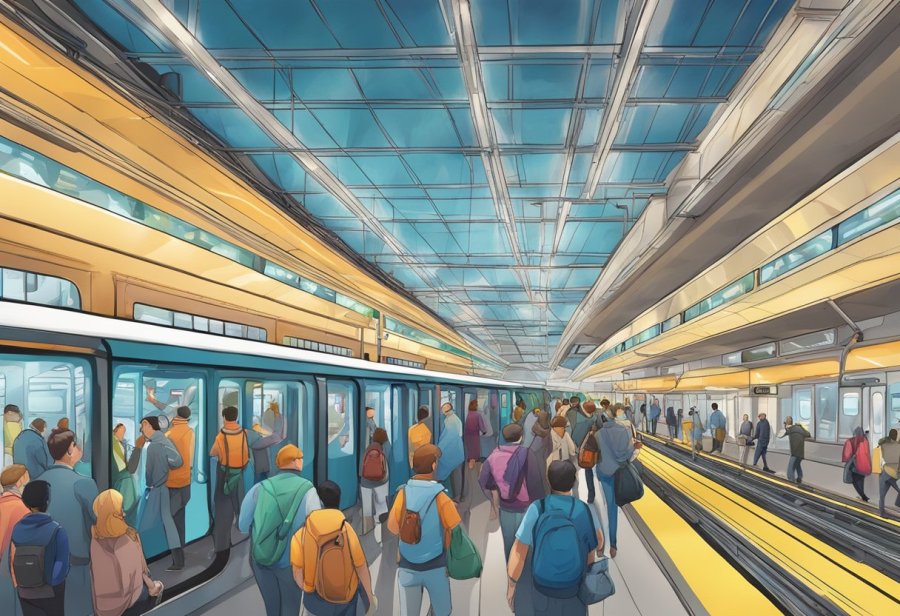
The operational hours of the station cater to a wide range of schedules, with extended services during weekends. To reach more specific areas of Dubai or to connect to the primary section of the Red Line, passengers can make a transfer at Jabal Ali station. The efficient transit service at Energy Metro Station reflects the city’s commitment to providing modern, reliable, and convenient travel options for its citizens and guests.
Energy Metro Station Timings to UAE Exchange – First Train and Last Train Timings

Energy Metro Station Timings to Jabal Ali – First Train and Last Train Timings

Overview of Energy Metro Station

Energy Metro Station is an integral part of the Dubai Metro network, located strategically in Jebel Ali, a bustling sector of Dubai, UAE. It sits along the Red Line, one of the two lines that comprise the city’s rapid transit network. The station falls within Zone 2 of Dubai’s transport zones, providing convenient access to various parts of the city.
The station is equipped with essential amenities to facilitate a smooth travel experience for commuters. Among the features are:
- Ticket Office: For purchasing and recharging Nol cards.
- Ticket Machines: For automated ticket transactions.
- Information Desk: To assist passengers with travel information.
The station is designed with accessibility in mind, ensuring that all areas are easy to navigate for people with disabilities.
On the map, Energy Metro Station is marked prominently, reflecting its importance within the network and its role in connecting passengers to different destinations. Furthermore, it plays a part in serving the energy sector employees and visitors, aligning with its apt name.
The Energy Metro Station efficiently meets the demands of daily commuters and occasional travelers alike, making it a vital cog in Dubai Metro’s Red Line operations. Its existence supports the city’s push towards sustainable transportation and infrastructure development.
Location and Accessibility

Energy Metro Station is strategically located in Jebel Ali, Dubai, on the Branch line of the Red Line, providing an important transport link to both residents and travelers. The station ensures notable levels of accessibility, with modern facilities including lifts, escalators, and toilets for public convenience.
Connecting Transport Services
- Buses: Energy Metro Station is well-served by a network of bus routes, offering easy access to various parts of the city including the business district and residential areas.
- Car: For those traveling by car, the location in Jebel Ali means there is a straightforward link to major roads.
Nearby Facilities and Attractions
- Parks: Parks and green spaces are located within a reasonable distance, providing leisure and relaxation opportunities.
- Emirates Golf Club: The renowned Emirates Golf Club is also accessible, appealing to both avid golfers and visitors seeking to explore local attractions.
- Palm Jumeirah: A short drive from the station, Palm Jumeirah stands as a testament to Dubai’s luxurious lifestyle and is a must-visit for tourists.
- Access to amenities: The station’s vicinity includes various facilities that cater to the needs of commuters, such as refreshment options and retail stores.
Station Design and Amenities
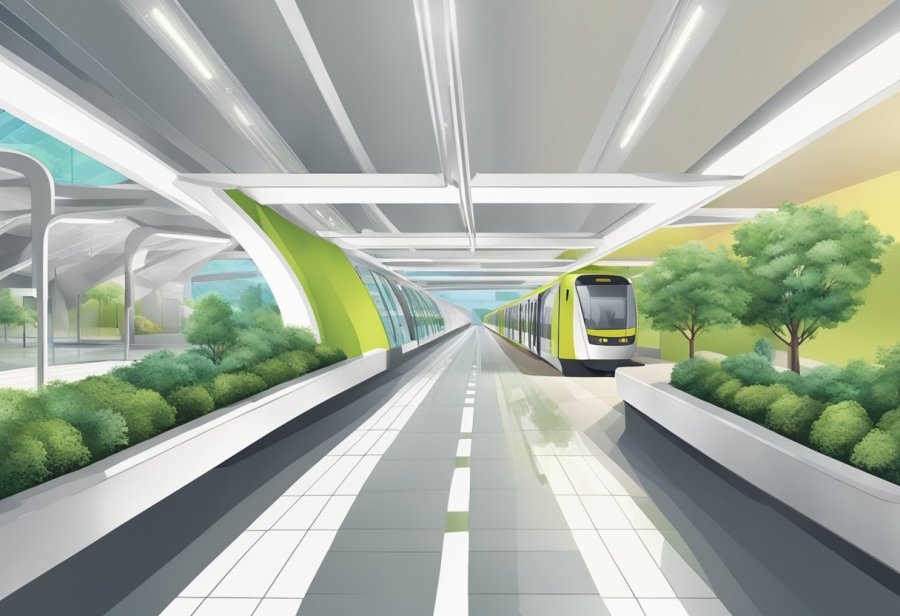
Metro stations are increasingly becoming hubs of activity beyond their primary role in transportation. The design elements and amenities within these stations aim to enhance user experience, manage energy consumption efficiently, and support the daily flow of commuters.
Retail and Convenience
Modern metro stations often integrate retail outlets and convenience stores to serve the daily needs of passengers. For example, a station situated in fare zone 2 might include a variety of shops offering everything from newspapers to snacks. These retail spaces are strategically placed to be easily accessible, increasing revenue and improving the commuting experience.
| Amenities | Availability |
|---|---|
| ATMs | Yes |
| Restaurants | Selected Locations |
| Convenience Stores | Throughout Station |
Safety and Maintenance
Safety is paramount in station design. Stations are equipped with advanced surveillance systems and emergency procedures to ensure the well-being of passengers. Regular maintenance of infrastructure such as lifts, escalators, and toilets is conducted to maintain functionality and hygiene. In the context of energy efficiency, stations incorporate LED lighting and smart sensors to reduce electricity usage, fitting in with broader environmental goals.
| Code | Feature | Description |
|---|---|---|
| ACE | Accessibility | Stations are furnished with lifts and are wheelchair-friendly. |
| BUS | Transit Integration | Seamless integration with buses for intermodal connectivity. |
| ESC | Escalators | Regularly serviced escalators for smooth passenger movement. |
Metro stations are designed to cater to the needs of the public, ensuring that whether they need to shop, use the restroom or grab a bite, facilities are available. Safety measures and maintenance are conducted with the utmost diligence to foster a secure and pleasant environment while honoring commitments to energy conservation.
Operational Hours and Timings
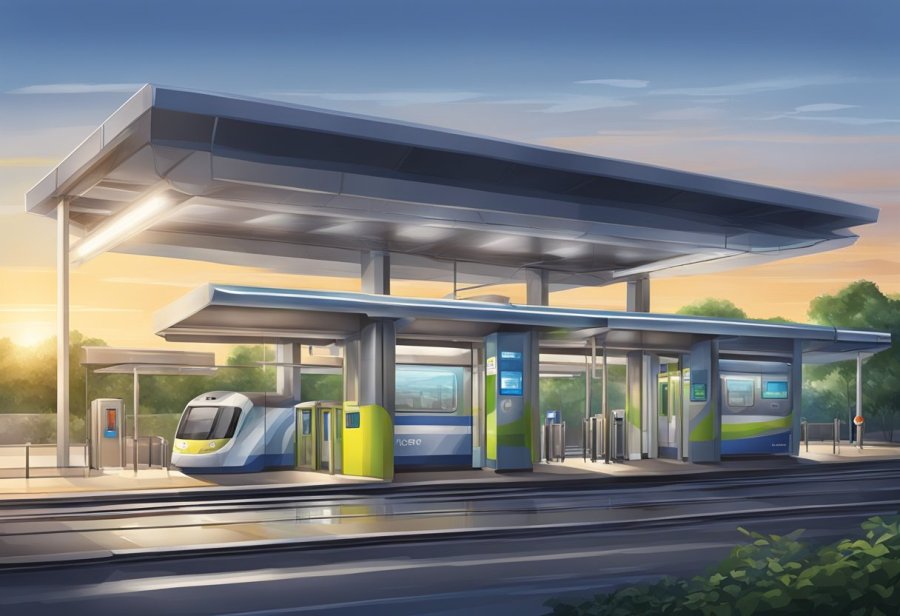
Energy Metro Station operates with precision, offering commuters clear and consistent schedules. Promptness and reliability define the service, ensuring smooth transit daily.
Weekday Schedule
Monday through Thursday, Energy Metro Station operates from 06:00 AM until 11:00 PM. The service is designed for the convenience of daily commuters and travelers, ensuring regular and efficient urban mobility.
Weekend and Public Holidays
On Fridays, which are considered as part of the weekend in Dubai, the station adapts to a leisurely pace, with services running from 02:00 PM until midnight. During public holidays, commuters can expect extended service hours, ensuring accessible transportation even during times of celebration or national events. Specific timings for public holidays may vary and are typically announced closer to the dates.
Ticketing and Fares
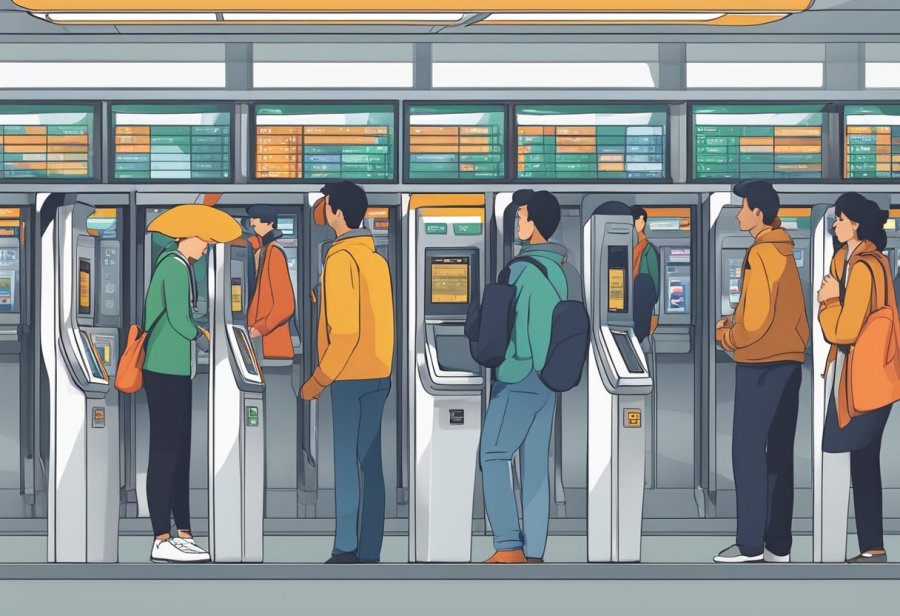
Energy Metro Station utilizes a straightforward ticketing system where fares are determined by the distance traveled within specific fare zones, ensuring passengers pay according to their use.
Fare Calculation
The fares at Energy Metro Station are structured into different zones, with the station itself located within Fare Zone 2. The cost of a journey is calculated based on the number of zones crossed during travel. For instance, traveling from a station in Fare Zone 1 to Energy Metro Station in Fare Zone 2 would incur a fee set by the specific transition between these fare zones.
Payment Options
Payment for travel can be made through multiple payment options, offering riders flexibility and convenience. Passengers have the choice to pay with:
- Cash: At ticket offices or machines located at the station.
- Credit/Debit Cards: Secure electronic payment systems are available for quick transactions.
- Prepaid Travel Cards: These can be topped up with funds and used for contactless entry and exit from the metro system.
Frequent travelers can benefit from discounted rates by utilizing prepaid cards, which are available at Energy Metro Station and can be recharged at designated points throughout the station or online.
Strategic Importance
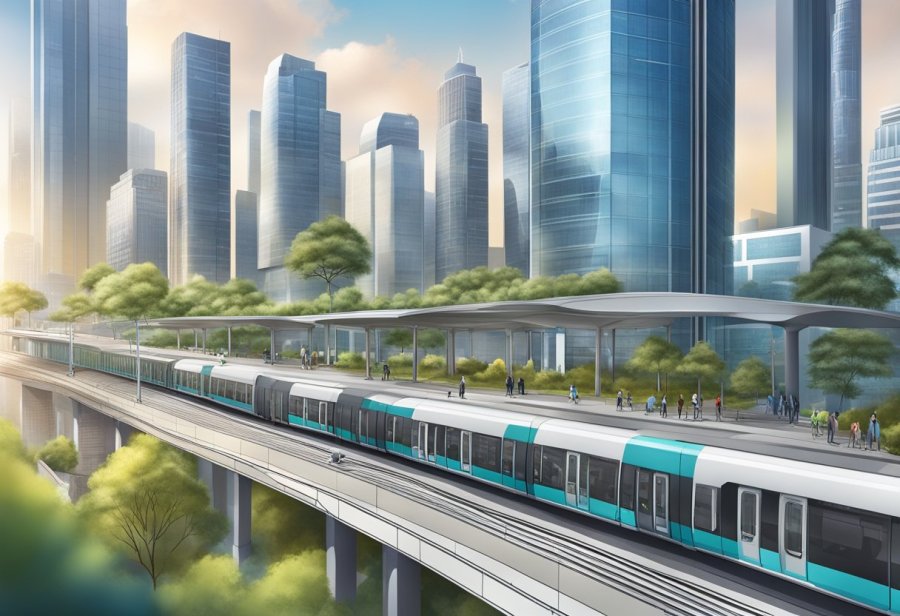
The energy metro stations play a pivotal role in the infrastructure and development of urban transportation networks. Anchored by their ability to facilitate movement and bolster economic growth, these stations are essential for city planning and urban mobility.
Connectivity to Major Districts
Energy metro stations, particularly those on the Dubai Metro Red Line, excel in connecting key districts. Stations like Burjuman Metro Station and Union Metro Station, where the Red Line intersects with the Green Line, are crucial transit points for thousands daily. These hubs link major areas such as Sheikh Zayed Road, Jebel Ali, and Al Furjan, providing vital connectivity from residential zones to business corridors.
Jebel Ali Metro Station serves as a strategic node, connecting to the industrial district of Jebel Ali and supporting the transport of workforce and goods. Meanwhile, proximity to retail centers like Festival Plaza enriches the user experience, offering convenient access to shopping and services.
Integration with Future Projects
The energy metro stations are designed to seamlessly integrate with future infrastructure projects. They are pivotal in the execution of long-term development plans across the UAE. Current projects assert the importance of these stations and ongoing expansions, such as extensions of the Dubai Metro Red Line towards Expo 2020, solidifying their role in the city’s future landscape.
Furthermore, the integration with systems like the Dubai Tram enhances connectivity and extends the reach of public transport. Energy metro stations near the Dubai International Airport allow for efficient travel to and from one of the world’s busiest airports, while the development around the Dubai Mall ensures that the metro remains an integral part of the city’s transportation network for both residents and tourists.
Related Commercial Areas
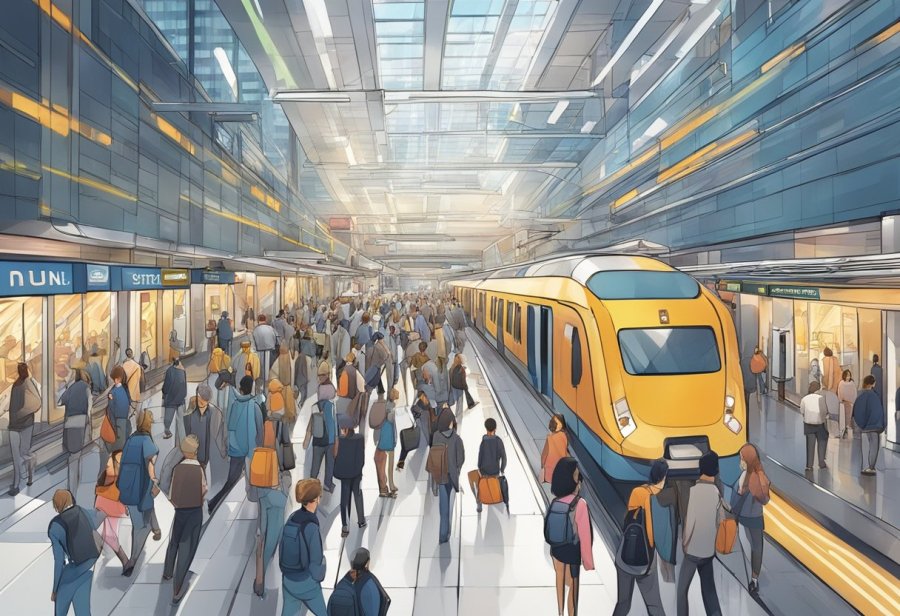
The Energy Metro Station caters to a multitude of commercial entities, providing easy access to world-class shopping and accommodation facilities. Strategically positioned, the station is a gateway for visitors and locals to engage in retail therapy or find excellent hospitality services.
Shopping Venues
Ibn Battuta Mall: Just a short ride from the Energy Metro Station, Ibn Battuta Mall stands as one of the largest themed shopping malls worldwide. Housing over 270 shops, including popular anchors such as Centrepoint and Lulu, it presents a diverse shopping experience influenced by the travels of the explorer Ibn Battuta.
- Festival Plaza: Known for its modern design and eclectic mix of stores, Festival Plaza, anchored by Ikea and Ace Hardware, is another retail haven that’s easily accessible from the Energy Metro Station, adding to the convenience of residents and tourists alike.
Hospitality and Accommodation
Avani Ibn Battuta Dubai Hotel: This hotel offers a contemporary, luxurious experience and is conveniently located in close proximity to both the metro station and Ibn Battuta Mall, ensuring that guests are never far from shopping and entertainment options.
- Oaks Ibn Battuta Gate Hotel: Positioned near the iconic Gurunanak Darbar Sikh Temple, Oaks Ibn Battuta Gate Hotel provides a blend of upscale living and accessibility to key landmarks, embodying a perfect match for travelers seeking both leisure and culture.
The area surrounding Energy Metro Station is rich in hospitality options, with a variety of hotels catering to a range of preferences and budgets, ensuring that every traveler finds a suitable accommodation.
Cultural Significance

The cultural significance of metro stations extends beyond their utility as transportation hubs. These stations can reflect a city’s history and contemporary cultural priorities, serving not only as points of transit but also as landmarks and canvases for public art and architectural expression.
Historical Context
Metro stations have often been erected in places with rich historical backgrounds. For instance, the Ibn Battuta metro station in the UAE is a testament to the profound appreciation for the journey of the famous explorer it’s named after. The station is not just a mere infrastructure asset but also an emblem of the regions cultural depth, positioned strategically as gateways to the past.
Art and Architecture
Metro stations are increasingly drawing the gaze of passengers upwards and around, transforming commutes into immersive cultural experiences. The flowing design, characteristic of energy-efficient structures, is epitomized in metro stations in various cities, integrating considerations for energy consumption with visual appeal. For example, artistic installations and the intricate design of Ain Dubai, visible from adjacent stations, highlight the interplay between metro systems and the landmarks they connect. The role of metro stations in exhibiting culture merges the functional with the inspirational, making places like EnergyMetro Station a part of the city’s creative fabric.
Future Developments

Upcoming enhancements to Energy Metro Station promise to significantly improve travel efficiency and access in Dubai. These range from notable infrastructure upgrades to ambitious expansion efforts.
Planned Upgrades
Dubai’s Energy Metro Station, an integral part of the city’s transport network, is set to receive a series of upgrades. These include modernizing the current facilities and improving service on the Red Line. These changes aim to provide both an increase in capacity and a more seamless travel experience for daily commuters and tourists alike. Enhanced connectivity to key points such as Jebel Ali and Palm Jumeirah is a high priority, ensuring better access to Dubai’s landmark destinations.
Expansion Initiatives
RTA Dubai has outlined ambitious plans to expand the reach of the metro system. Central to these initiatives is the development of a branch line to further connect the sprawling city. Such expansion supports the strategic vision for Dubai’s transport future, emphasizing sustainability and reduced reliance on individual car usage. Moreover, these initiatives are expected to significantly boost the accessibility to the outskirts of the city, fostering urban growth and expediting commutes.
Frequently Asked Questions
This section covers some common inquiries about navigating from Energy Metro Station to various points of interest, understanding the Dubai Metro system, and practical tips for using the metro services.
How do I get from Energy Metro Station to IKEA Jebel Ali?
To reach IKEA Jebel Ali from Energy Metro Station, one may use the shuttle bus services that connect directly with the store, or take a taxi for a more direct route.
Can you provide directions from Energy Metro Station to Jebel Ali Temple?
From Energy Metro Station, the Jebel Ali Temple is accessible by taking a short taxi ride. There are no direct metro lines to the temple from the Energy Metro Station.
Where can I find the Dubai Metro map including Energy Metro Station?
Detailed Dubai Metro maps are available online and at all metro stations. They provide a comprehensive view of the entire network including the Energy Metro Station.
What are the new names for metro stations on the Red Line near JLT?
The names of metro stations can change, for updates on station names near Jumeirah Lakes Towers (JLT), refer to the official Dubai Metro website or inquire at any metro station.
What time are the peak hours for commuting on the Dubai Metro?
Peak hours for commuting on the Dubai Metro typically are from 6:30 AM to 9:00 AM and from 5:30 PM to 8:00 PM on weekdays.
How can I purchase a metro ticket and what are the fares from Energy Metro Station?
You can buy tickets at station ticket booths, automated vending machines, or by using the Nol card system. The fares vary depending on the number of zones crossed. Currently, the fares start from 3 AED for a single journey within one zone for those using a standard Nol card.






